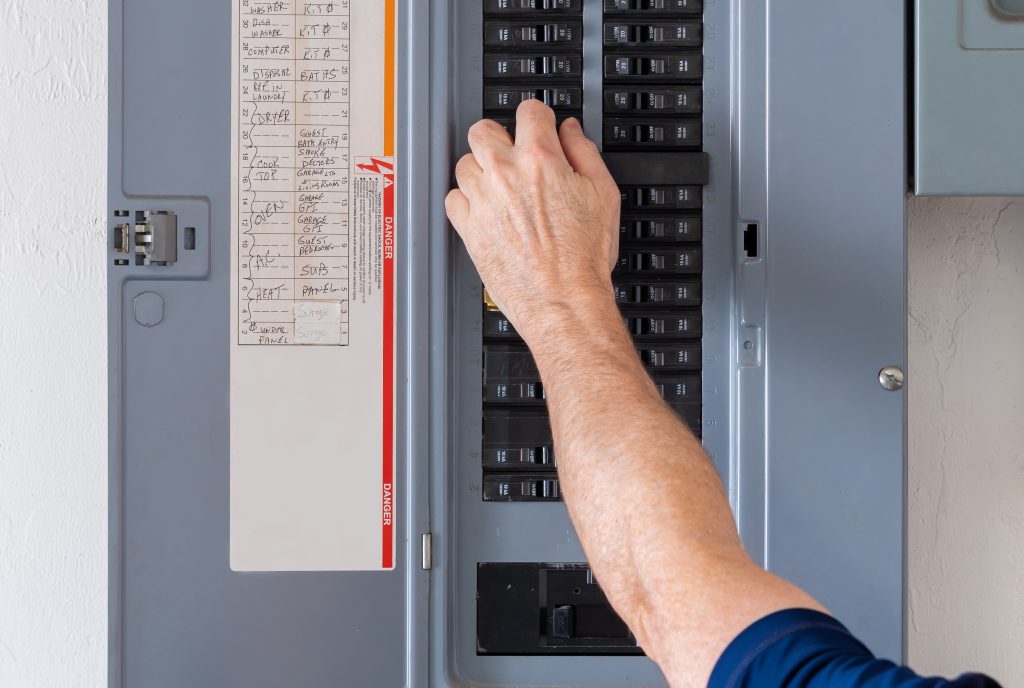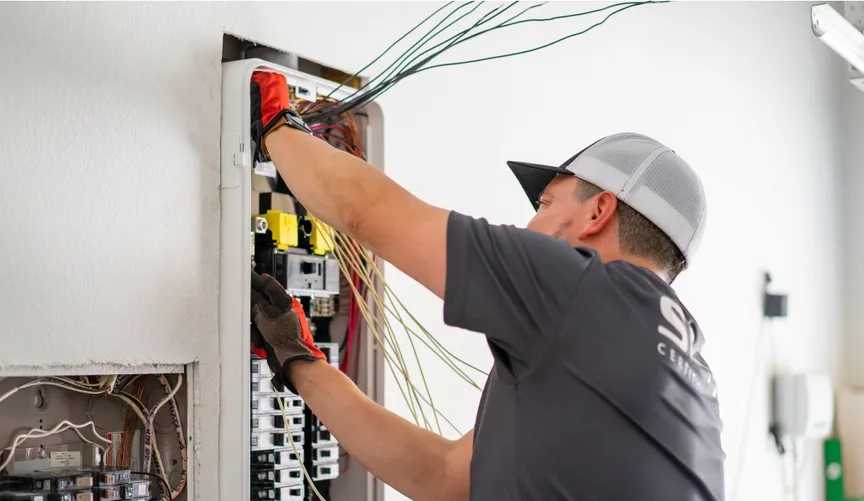Electrical Panel Upgrade: Your Ultimate Guide

Is It Time to Replace Your Electrical Panel?
One of the most common reasons for wanting/needing an electrical panel upgrade is to make room for additional electrical needs. Adding an extra or larger air conditioner, an addition on to your home, or charging station for a car or camper can require upgrading your electrical panel.
You should also consider making an upgrading your electrical panel if:
- Is older than 25 years old
- No longer meets code and is not approved by your local jurisdiction
- Has regularly tripping breakers
- Is not large enough to support an increased electrical load
- Is warm to the touch
Other reasons to replace your panel include:
- If your home has flickering or dimming lights
- Buzzing or crackling sounds when lights are on
- To support a remodel or addition to your home
These are the most common reasons that are linked to having a faulty electrical panel or need to upgrade. If your panel happens to be malfunctioning or inadequate for your needs, you run the risk of fire or damage to the electrical systems in your home.
Know the Signs to Replace Your Electrical Panel

Your electrical panel is the heart or central hub of your homes electrical system. It's responsible for controlling all your circuits. It is crucial to be aware of the signs that indicate you need an electrical panel upgrade or replacement. Running your home off an insufficient or deteriorated panel is a serious safety risk. Damaged panels can result in electrical fires and smoke that put you and everyone in your home in danger.
Upgrade Your Electrical Panel If...
Your control panel is 25 years or older
Your panel is overheating
Your panel smells like its burning
Breakers are constantly tripping
Strange noises are coming from panel
Ask Yourself the Right Questions
Knowing what questions to ask will help you to determine if you're in need of an electrical panel upgrade or not. Walking through a simple diagnostic process can determine if you should call and electrician to further investigate.
How Old is Your Panel?
Older electric panels typically have a difficult time keeping up with the demands of newer and larger appliances in the home. These devices aren’t built to last forever. On average, your panel box only has a life span of about 25 years. When you factor in the age of your panel in addition to any new or upgraded appliances, you need to keep in mind that this is putting immense stress on your aging panel. The more you stress it, the faster it will age and need to be replaced.
How Hot is Too Hot?
Your electrical control panel is the heart of your home's electrical system. Not only does it allow you to turn circuits on and off, but it also prevents the build up of excessive amounts of electricity. As such, with a tremendous amount of power running through it, if it beings to malfunction it will tend to overheat.
It’s important to note that your panel device should be about as warm as any other appliance in your home that draws constant power, like your fridge or television. A little warmth is normal.
When electricity passes through the wires that are installed in your home it leads back to your electric panel. As it is drawn into the wires it will meet some resistance. This is why electronics and appliances that draw constant power will feel warm to the touch. However, when your panel is overheating it will try to protect itself by tripping that specific circuit, forcing it to shut down. Your control panel may be warm but it should never be hot. If it is, we recommend calling an experienced electrician immediately to investigate.
What's That Smell?
A burning smell from your electric panel could mean your circuit breaker is overheating or a wire’s insulation is burning. Both of these problems are serious and could lead to an electrical fire. If this is occurring, take immediate action by following the steps below:
- Turn off any important electrical appliances in your home before you cut power to protect them.
- Turn off the power to your circuit breaker.
- Call an electrician.
If you’re smelling something burning it’s a good indication that your panel is no longer working properly and an electrical panel upgrade is of the upmost importance. Your control panel has a safety mechanism which is designed to “trip” when it is being overloaded to stop the flow of electricity to prevent a fire, but this is not guaranteed. A defective circuit breaker incapable of tripping poses an increased risk of an electrical fire and makes this an urgent issue.
Are Breakers Tripping Often?
If circuit breakers are tripping regularly, you have a problem. The most common cause of a tripped circuit breaker is an overload in that circuit. Each circuit is only intended to carry a certain electrical load. If it exceeds that limit your circuit breaker will trip.
Some appliances in your home will have a dedicated circuit, like your stove or dryer, making it easy to identify if the issue is with a malfunctioning appliance. In these cases, the issue may not be with your panel or breaker but instead with the appliance itself. However, you'll likely need an electrician to evaluate this and confirm the cause.
When a circuit is overloaded and it isn't due to a malfunction in an appliance or device tied into that circuit, it's possible you simply have too many things drawing power. It's necessary to make up for the additional load on your electrical panel caused by your new appliances by adding additional circuits or upgrading your panel. Continually overloading a circuit can cause the wires to heat up thus posing a fire risk.
Are Breakers Not Tripping When They Should?
A malfunctioning panel can pose a serious fire risk when breakers are failing to trip when they should. This has been known to happen with Federal Pacific Panels and others, so much so that many insurance companies will drop your coverage if you do not update your panel. If you have a panel type like a Federal Pacific, it's definitely time to replace.
Is It Making Noise?
Some noise is normal. Gentle humming noises are perfectly fine to hear when you're right next to your panel. A slight hum is typical and circuit breakers will often produce a humming noise from the vibration of electrical currents.
Cause for concern comes when that hum becomes loud enough to hear it when you’re a couple feet away or when it has turned into a buzzing. The loud hum or buzzing may indicate that a circuit breaker didn’t trip when it should have. The unregulated flow of current can be noisy and poses a safety risk. If you're hearing loud buzzing noises coming from any electrical device, it’s best to call your local electrician to inspect it.
Experiencing Electrical Panel Issues?
If your panel is older than 25 years and you’ve been experiencing any of the problems discussed above then it’s time to call a professional to do an electrical panel upgrade or complete replacement. It's best not to wait with matters such as these due to safety concerns. Give us a call today and we will send out a licensed, experienced electrician to ensure everything is in working order.
Can I Upgrade My Electrical Panel Myself?
In most jurisdictions, upgrading an electrical panel requires a master electrician's license. While there are areas that offer exceptions, generally this is a hard and fast rule. Not only is a license required to make it a lawful upgrade, but typically you cannot get the utility company to restore power without showing a permit and passed inspection for the upgrade, which means you really will need a licensed electrician to take care of it for you.
Federal Income Tax Credits Are Available
According to the inflation reduction act of 2022, savings for home owners in the form of tax credits are available through 2032 providing up to $3,200 annually to lower the cost of energy efficient home upgrades by up to 30%. This tax credit will cover improvements such as installing heat pumps, heat pump water heaters, insulation, doors and windows, qualifying electrical panel upgrades, home energy audits, and more.
Will My Electrical Panel Upgrade Be Covered By This Credit?
According to EnergyStar.gov, your panel upgrade could be covered if it meets the following criteria:
“Any improvement to, or replacement of, a panelboard, sub-panelboard, branch circuits, or feeders which:
1. is installed in a manner consistent with the National Electric Code,
2. has a load capacity of not less than 200 amps,
3. is installed in conjunction with, and enables the installation and use of:
• any qualified energy efficiency improvements, or
• any qualified energy property (heat pump water heater, heat pump, central air conditioner, water heater, furnace or hot water boiler, biomass stove or boiler)”